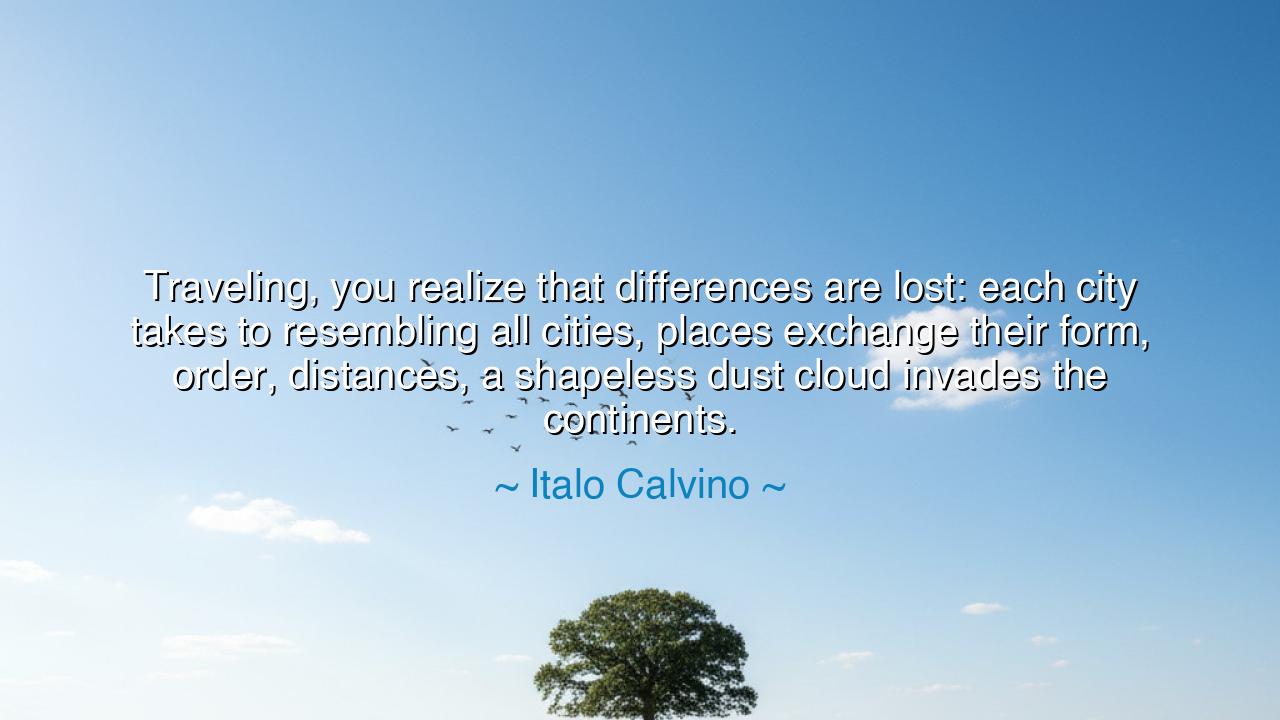
Traveling, you realize that differences are lost: each city
Traveling, you realize that differences are lost: each city takes to resembling all cities, places exchange their form, order, distances, a shapeless dust cloud invades the continents.






Hear, O seekers of wisdom, the words of Italo Calvino: “Traveling, you realize that differences are lost: each city takes to resembling all cities, places exchange their form, order, distances, a shapeless dust cloud invades the continents.” This is no idle musing, but a lament, a vision, and a warning. For Calvino, master of invisible cities and dreamlike worlds, speaks of a danger not of the past but of the modern age—the danger of sameness, of the slow erasure of uniqueness, of the soul of cities dissolving into a grey fog of uniformity.
In ancient times, to travel was to step into difference. The roads of Rome led to lands where languages, colors, foods, and gods shifted with every mile. To cross from Athens to Egypt was to be struck by the enormity of change: temples unlike one’s own, hieroglyphs unreadable, rituals unfamiliar. Difference was the teacher of the traveler; it humbled him, it widened his world. But Calvino warns us that in our time, this gift fades, as cities become mirrors of one another, as plazas echo plazas, as towers rise alike on every shore.
What does it mean for a city to resemble all other cities? It means that the places we inhabit, once living with their own breath, now surrender to sameness. Airports look alike, hotels wear the same face, shops sell the same trinkets, chains repeat across oceans. The traveler moves, but his soul remains still, for what he encounters is not the shock of the new, but the dull echo of the familiar. Thus does the dust cloud spread—featureless, shapeless, smothering the uniqueness of the earth.
History offers us examples of this shadow. Consider the march of empire: when Rome spread across the Mediterranean, it built forums, baths, amphitheaters, and roads in every province. Though mighty, this expansion often crushed local traditions beneath the weight of Roman order. A Gallic town became indistinguishable from one in Spain; a city in Africa wore the same stones as one in Italy. The empire gave unity, but at the price of difference. Calvino sees in the modern world a similar empire—this time not of soldiers, but of commerce, media, and architecture.
Yet, there is still resistance. Even in a globalized world, some cities guard their soul. Think of Kyoto, where temples whisper of centuries past, even as neon lights burn nearby. Think of Venice, Calvino’s own beloved image, which, though invaded by tourists, still resists becoming wholly like others, its canals stubbornly unique. These remind us that identity can survive the storm, if cherished and protected. But if neglected, it dissolves, swallowed into the dust.
The lesson for us is thus: as we travel, we must not be content to drift on the surface, seeing only the familiar chains and facades. We must dig deeper, seek the living core of a place—its stories, its people, its hidden corners. If we walk only in the shadows of sameness, we will find Calvino’s prophecy fulfilled, and the world will indeed become a cloud of dust. But if we seek what is unique, what is fragile and particular, we keep alive the flame of difference.
Practically, this means: when you journey, avoid only the polished centers—walk the side streets, eat where the locals eat, listen to the songs sung by ordinary voices. Learn a word of the language, honor a custom, seek out what is unlike your own world. And in your own city, fight to preserve what makes it unique—its parks, its traditions, its festivals—lest it too dissolve into the fog of sameness.
Therefore, O children of tomorrow, remember Calvino’s warning. The world longs to reduce itself into a dust cloud of repetition, but you must be guardians of its diversity. Let each city keep its soul, let each place shine with its own light. For without difference, there is no wonder, and without wonder, travel becomes empty. Seek the distinct, cherish it, and pass it on—so that the earth remains a tapestry, not a blank cloth.






AAdministratorAdministrator
Welcome, honored guests. Please leave a comment, we will respond soon